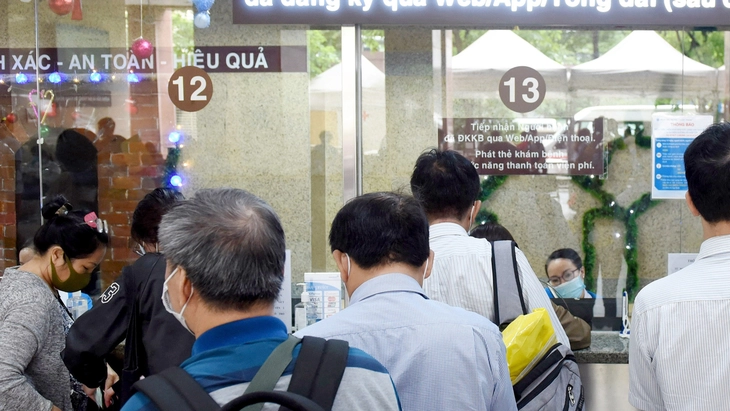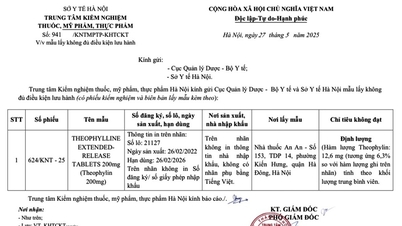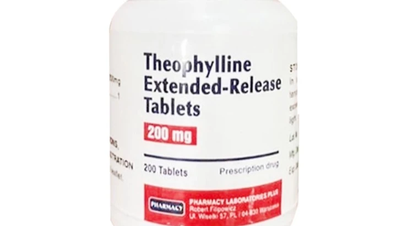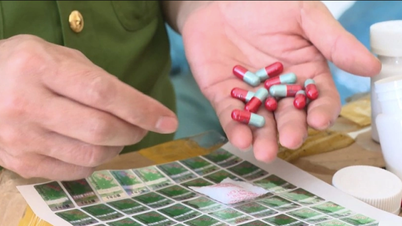
People do procedures for health insurance at a hospital in Ho Chi Minh City - Photo: DUYEN PHAN
In recent times, end-line hospitals have often been overloaded as the number of patients coming for examination and treatment has increased. Among them, many chronic patients who have been treated stably have to wait all day to receive regular treatment medication once a month.
Reduce visits, save time
Many chronic patients share that they often have to wait from getting an examination number, testing (if prescribed by the doctor), waiting for results, getting medicine... and often for patients who have been treated stably, this prescription does not change.
Deputy Director of Vietnam Social Security (VSS) Nguyen Duc Hoa said that during the isolation period due to the COVID-19 epidemic, the Ministry of Health and VSS have instructed hospitals to dispense medicine every 2-3 months to patients with chronic diseases who have been treated stably.
After the pandemic, this drug distribution was carried out according to the old regulations (every 30 days). Recently, Vietnam Social Security has repeatedly proposed that the Ministry of Health extend the time of drug distribution for this group of patients to 2-3 months/time to reduce travel and waiting time for patients, and reduce hospital overload.
Mr. Hoa shared that this proposal is based on expert opinion that patients with stable chronic diseases do not need to change their medications frequently. He also cited that many countries have applied 60-day prescriptions. In Thailand, since 2010, drugs have been provided every 2 months for patients with stable chronic diseases.
The change in drug dispensing time is assessed by Vietnam Social Security to help patients extend their re-examination time, save them time, travel, and reduce the burden on hospitals.
In June 2024, the Hanoi Department of Health proposed a pilot implementation of 2-month chronic medication at Xanh Pon General Hospital. In which, analysis of data during the COVID-19 epidemic showed that 2-month medication for stable chronic diseases was really effective for both patients and hospitals; reducing the waiting pressure for patients, especially the elderly and those with poor health.
Since November 2024, Xanh Pon Hospital has applied the dispensing of medicine every 2 months for chronic patients. Mr. Luong Duc Dung - Head of the General Planning Department of Xanh Pon Hospital - said that the rate of patients receiving medicine every 2 months who have to return for a re-examination within 50 days (nearly 2 months) accounts for 3% of this group; the main reasons are the appearance of side effects, unwanted reactions, need to adjust the dose or change the medicine, the occurrence of unusual symptoms...
97% of the 2,300 patients who were given longer-term medication were treated safely and did not need to return for a check-up before coming for a new check-up. Mr. Dung said that this helped save travel time and waiting time, especially for patients who are elderly or live far from the hospital.
According to Mr. Dung, for hospitals, this policy also contributes to significantly reducing the frequency of patients coming to the hospital, especially during the busy hours of 8-10am and 1-3pm, thereby facilitating professional work in the examination departments.
He also stated that Xanh Pon Hospital currently has 230,000 people with health insurance cards registered for initial medical examination and treatment. If the number of chronic patients registering to receive medicine every 2 months increases, the reduction effect could be even higher.
Calculate to suit specific case
At a meeting on the proposal for prescription time and dispensing of outpatient drugs for chronic diseases by Vietnam Social Security, Mr. Nguyen Trong Khoa, Deputy Director in charge of the Department of Medical Examination and Treatment Management, asked for experts' opinions on the proposal of Vietnam Social Security and the Hanoi Department of Health.
According to doctors, specialists and professional associations also proposed to consider adjusting the prescription time for some chronic diseases that have been treated stably, which could be a maximum of 60 days or 90 days, or even longer.
However, the time to prescribe medication in each case must specifically consider the disease and the patient's condition; treatment effectiveness and patient safety must be the top priority.
An endocrinologist also said that many people now have an understanding of their chronic diseases, and longer-term medication can reduce the possibility of patients forgetting or interrupting their medication. However, each patient must be counseled and directed to a medical facility when symptoms become severe.
"We also need to consider the case where a patient has not used up all the medicine but has returned for a check-up due to a serious illness, has to change the medicine, and has to return the previously issued medicine. How should this be handled? Will a patient whose health insurance card is about to expire be given enough medicine for 2-3 months?
It is also possible that when the prescription is longer, some patients, even though not stable, still want to be given medication for a longer period of time, and doctors who do not prescribe are considered "difficult", causing unwanted negative reactions. These situations can all happen and need specific guidance from the authorities," said this doctor.
Speaking to Tuoi Tre on May 21, the leader of the Department of Medical Examination and Treatment Management under the Ministry of Health said that this unit is drafting amendments to Circular 52 regulating prescriptions and the prescription of pharmaceutical and biological drugs in outpatient treatment. The Department has consulted hospitals and experts and will hold a professional council meeting to propose appropriate amendments before promulgation.
Many people expect that when revised, Circular 52 will add an increase in the time it takes to provide medicine to chronic patients.
Health insurance must be convenient for people
Speaking with Tuoi Tre, Ms. Tran Thi Trang, Director of the Department of Health Insurance (Ministry of Health), expressed her agreement with the proposal of Vietnam Social Security on extending the time to provide medicine for chronic patients.
Ms. Trang said that with many chronic patients who have been treated stably, the time to dispense medicine can be increased, not only convenient for patients who do not have to travel and wait, but also helps reduce the hospital's load. "When the hospital reduces the number of chronic patients, it will have time and human resources to examine and treat more seriously ill patients," Ms. Trang said.
In addition, she also believes that extending the time to provide medicine will also save the health insurance fund by reducing the number of visits and tests (if any). When the health insurance fund is saved, it will help to have resources to expand benefits for patients. "However, the top priority is still to ensure effective treatment for patients," Ms. Trang emphasized.
Source: https://tuoitre.vn/cap-thuoc-cho-nguoi-benh-2-thang-lan-dung-chan-chu-nua-20250527225811722.htm



![[Photo] Prime Minister Pham Minh Chinh meets with Hungarian President Sulyok Tamas](https://vphoto.vietnam.vn/thumb/1200x675/vietnam/resource/IMAGE/2025/5/29/dbcaa73e92ea4448a03fe1d0de6d68e8)
![[Photo] Vietnamese and Hungarian leaders attend the opening of the exhibition by photographer Bozoky Dezso](https://vphoto.vietnam.vn/thumb/1200x675/vietnam/resource/IMAGE/2025/5/29/94d8ceca5db14af3bf31285551ae4bb3)
![[Photo] Prime Minister Pham Minh Chinh receives a bipartisan delegation of US House of Representatives](https://vphoto.vietnam.vn/thumb/1200x675/vietnam/resource/IMAGE/2025/5/28/468e61546b664d3f98dc75f6a3c2c880)

















































































Comment (0)